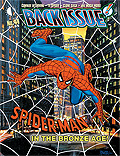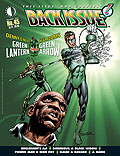Doug: My wife and I were recently offered a deal we couldn't refuse on a used vehicle. We weren't in the market, as the SUV I was driving had relatively low miles for its age and had been paid off for several months. Yet we were able to upgrade after negotiating a best-case scenario trade-in and adding several thousand dollars from my original art sales as a down payment on the new loan. I say all that to tell you that the new SUV has satellite radio capabilities, so I've been enjoying an introductory offer from Sirius-XM radio. For those who don't know, satellite radio not only offers several "genre stations" across the musical spectrum, but also stations dedicated to specific artists. I've also enjoyed their "decade stations", featuring popular music from the timeframe we cover on this blog -- the 1960s, 1970s, and 1980s. And it was a day not too long ago while listening and driving that the inspiration for today's topic struck me.
Doug: Simple question -- of the three decades just mentioned, during which do you feel popular music changed the most? Of course music exists in so many layers that many of us will approach our answers with different songs or artists in mind. I hope that will be a fun part of the conversation. For example, I might think of the early 1970s as characterized by the advent of AM radio "soft rock" and the end of the decade as the "disco era". You might have thought of some of the hard rock acts emerging from the 1960s, with the '70s ending with punk. Regardless of who or what you choose to cite, in your opinion which decade's music had changed the most by the time the next decade rolled round?
 |
| http://www.bionicdisco.com/wp-content/uploads/2011/03/bionic_disco_music.jpg |



















































10 comments:
I'm in a bit of a rush right now, but just had to comment quickly on two things:
1. that picture of the Bay City Rollers. I think I've mentioned it here before, but wow that brought back memories. That was my first favorite band, back when I was about 6/7 years old. A bit embarrassing to admit now...
2. Hopefully I'll be able to respond at greater length later, but I say the 1970s. I think popular music changed the most during that decade, and in general it was characterized by the emergence and/or popularization of so many different styles or genres or whatever you want to call them (yes disco and punk, but also funk, glam, prog and the hard rock stylings that would later become heavy metal, just to name a few).
Ah, a chance to put on the old thinking cap (or in this case, thinking headphones); great topic Doug!
It's certainly debatable, but to my eye (ear) the 60's were the decade with the greatest disparity from beginning to end. Followed by the 70's, then the 80's and proceeding through the 90's and up to today. It seems recent decades are more homogenous (lots of genres, but not much musical progression). A song from 2001 (Beyonce, for instance) sounds like it could come from today's Billboard chart.
Compare this to the 60's. At the start of the decade, you still had the likes of Pat Boone, Paul Anka and Connie Francis topping the chart. By decade's end, they were pretty much gone. Still had soft sounds (Carpenters,for instance) but the influence of the Beatles, Motown and others was inescapable. It's a hoary cliche, but the 'envelope had been pushed' with rampant experimentation.
The 70's also changed quite a bit musically, as Doug said. The first half of the decade was pretty diverse: pop, soul, rock, singer/songwriters. The latter half was dominated by disco, and the emergence of punk/new wave. Of course, there were connections from start of decade to end: Bee Gees had hits early ("How Can You Mend a Broken Heart", and many more at the end (no further explanation necessary).
The 80's seemed to me less changed from start to finish. Many of the popular acts were found at both ends, and later in the decade there seemed to be a re-emergence of popular 70's /early 80's acts ( Boston, Kansas, Heart). And, of course, Michael Jackson was huge throughout the decade...
Totally agreeing with Redartz on the seemingly unchanged pop music landscape since the '00's started, I just figured it was my increasingly-curmudeony ears talking to me. Glad I'm not the only one.
I see it more as a weaving between industry and artist. Renovations of sound, of attitude, of marketing, certainly fed the rise of the Fabs (Beatle Talcum Powder..? Really..?) and other less-subtle schemes contrived by the corporate likes of Kirshner back with the Monkees.
I mention attitude because, before George Harrison.., how many pop bands touted the label 'lead guitarist' in their promos?
I do feel the '70s notched up diversity up a few rungs after the 60s, as Redartz again mentioned the extreme change we witnessed, and the industry typically 'initially balked at, then engulfed' the new trends, all hungry for market share and profit.
You did see that in the 60s to an extent, a prime example of change was seen from the 'TAMI Show' where you had all diverse acts on one stage.., to Woodstock ('Sha Na Na' being the noticeable/and near comical exception to that show...). By the mid-'60s, all the diverse music had their own studios, record companies (Motown), and distinctive record charts.
And lest we not forget the advent of FM Radio which cultivated even more underground directions at that point as well.
I'll go with Redartz and say the '60s. When you think of the crew cuts at the beginning of the decade, then Led Zeppelin at the end. The fuzz distortion on guitars changed the sound, with The Kinks on You Really Got Me and the Stones on Satisfaction. Interesting that Keith Richards didn't think his famous riff on Satisfaction was going to stay in the song. From Wiki: "Richards envisioned redoing the track later with a horn section playing the riff: 'This was just a little sketch, because, to my mind, the fuzz tone was really there to denote what the horns would be doing.' The song's success boosted sales of the Gibson fuzzbox so that the entire available stock sold out by the end of 1965."
I like the variety on satellite radio, like the decade stations. Also there's a Canadian station that plays bands just under the radar of mainstream stations. The Glorious Sons are a fresh new Canadian band with a rockin' live show. My band covers their song Mama: https://www.youtube.com/watch?v=TUTZebZIun8 They've gone from warmup act to headliners in the last year.
David Myles is another Canadian singer worth a listen. Saw him recently in concert, and he was like a mix between Buddy Holly and Lyle Lovett. Do people outside of Canada know the song Inner Ninja? https://www.youtube.com/watch?v=7fDuNuFNG38 Big hit a couple years ago, but not typical of his style. Myles is the skinny guy singing, not the rapper. Here he is with an acoustic song: https://www.youtube.com/watch?v=SOznZ2cKqJ8
Agree with the above insofar as the music of the 70s was pretty much defined by the changes that took place in the 60s, but I'm going to be the odd one out and argue for the 80s.
That was the decade when music went from being analogue to digital which is a huge change. Its completely changed how music is performed and sounds, including old stuff (since then,"remastered" reissues have replaced originals).
-sean
The '60s, if only because of the Beatles, Bob Dylan, and Motown. Also: Rock came back and the sound expanded ("Love Me Do" vs. "Helter Skelter"), folk went electric, the British invasion brought blues sounds to the mainstream, you had proto-punks like the Stooges and art-rock like the Velvet Underground, Jimi Hendrix!!!, James Brown and others made early funk...
I could go on but my break's over...
- Mike Loughlin
I'd have to agree with Edo and say music changed most in the 70s. It started with a lot of spillover from the 60s but moved on...punk, funk, disco, avant garde stuff like Roxy Music, Steely Dan, early Genesis, the beginnings of New Wave; hell, the Rolling Stones themselves changed genres about 5 times during the 70s :)
I think society in general changed from the "make love not war" optimism of the 60s to the cynical "Me decade" tone, brought on by Vietnam, racial unrest, the gas shortage, drugs, urban blight, terrorism, and all that. So, music changed too, either to reflect the new outlook or to push back against it.
@Garett: I've never heard of David Myles...my first thought was "I wonder if he's related to Alannah Myles", but that doesn't seem to be the case.
Mike Wilson
I kind of see a paralell between the music and the comics of these decades (yeah, it always comes back to comics for Ol' Groove).
In the Sixties we watched talented folk stretch the boundiaries of both pop music and comics, as well as re-define and go a long way toward making them more widely popular (the Beatles, Dylan, the Stones, Motown, and even guys like Buck Owens come to mind for music, while Stan, Jack, Steve, and the Marvel Gang for comics, natch).
During the Seventies (my favorite period for both music and comics) we saw new folk come in and take both pop music and comics in a wide variety of directions become more specialized and introspective, while at the same time become even more commerial (Marvel, DC, AM Radio on the one hand, "above-ground" publishers like Star*Reach, Heavy Metal, early Eclipse, and FM radio on the other hand).
The early 80s gave us even more new directions (based mostly on HOW things were done--Baxter and Mondo printing, processed color in the comics, heavy reliance on electronic devices in music).
I know I'm simplifying and generalizing enough, but I hope you're getting my vibe. I mean, for each decade the look of comics and the sound of the music is pretty easy to spot. You'd never mistake an Eightiess song or comics for a Sixties song or comic, would you?
Love all three eras (the Seventies the most), but the Sixties really started the ball rolling in re-defining things, imho.
Man, what a bunch of typos! Sorry folks! That's what I get for trying to sneak in a response while at school! Leave me alone, kids, I'm talking comics! :D
Hey Mike, I hadn't thought of that Myles connection. I don't think they're related. I know David is from the East Coast.
Post a Comment